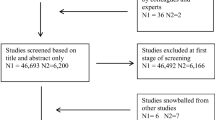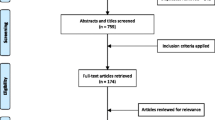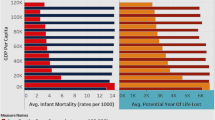Abstract
In this paper, we examine the income gradient in child mental health using longitudinal data from a large, national cohort of Australian children. We contribute to the body of existing literature by: (i) investigating whether and to what extent a child’s mental health levels and their relationship to income vary when a child’s mental health is assessed by the child’s parent, the child’s teacher and the child her/himself; (ii) exploring whether the reporting differences in a child’s mental health is associated systematically with household income; and (iii) examining the child mental health gradient and the evolution of this gradient by the child’s age. We found that a child’s mental health and the income gradient vary depending on who assesses the child’s mental health (the gradient was the largest when assessed by parents and the smallest when assessed by the child). Furthermore, the magnitude of the effect of mental health and income gradient faded when we controlled for some important variables, such as maternal health.



Similar content being viewed by others
Notes
We thank a reviewer of this journal for this suggestion.
The weekly income data was collected from responses to the following question “Before income tax is taken out, how much does … usually receive from all sources in total?” Unfortunately, LSAC lacks sufficient information on the income of other household members, so we were unable to use household income similar to Johnston et al. [26] and instead we used parental income.
Parental reports come from the child’s main carer, or Parent 1 in LSAC (i.e. the parent who knows the child best). In these data, in over 95 % of the cases this is the child’s biological mother. For simplicity, in the remainder of the paper we refer to Parent 1 as the mother.
However, we provide the results of fixed-effects estimator in the Appendix for interested readers.
References
AIFS (2005) Longitudinal study of Australian children data user guide. Australian institute of family studies
Apouey, B., Geoffard, P.-Y.: Family income and child health in the UK. J. Health Econ. 32(4), 715–727 (2013)
Bago d’Uva, T., Van Doorslaer, E., Lindeboom, M., O’donnell, O.: Does reporting heterogeneity bias the measurement of health disparities? Health Econ. 17(3), 351–375 (2008)
Brown, J.D., Wissow, L.S., Gadomski, A., Zachary, C., Bartlett, E., Horn, I.: Parent and teacher mental health ratings of children using primary-care services: interrater agreement and implications for mental health screening. Ambul. Pediatr. 6(6), 347–351 (2006)
Burgess, S., Greaves, E.: Test scores, subjective assessment, and stereotyping of ethnic minorities. J. Labor Econ. 31, 535–576 (2013)
Case, A., Lubotsky, D., Paxson, C.: Economic status and health in childhood: the origins of the gradient. Am. Econ. Rev. 92(5), 1308–1344 (2002)
Condliffe, S., Link, C.R.: The relationship between economic status and child health: evidence from the United States. Am. Econ. Rev. 98(4), 1605–1618 (2008)
Cornaglia, F., Crivellaro, E., McNally, S.: Mental health and education decisions. Labour Economics 33, 1–12 (2015)
Currie, J., Stabile, M.: Socioeconomic status and child health: why Is the relationship stronger for older children? Am. Econ. Rev. 93(5), 1813–1823 (2003)
Currie, J., Stabile, M.: Child mental health and human capital accumulation: the case of ADHD. J Health Econ 25(6), 1094–1118 (2006)
Currie, A., Shields, M.A., Price, S.W.: The child health/family income gradient: evidence from England. J. Health Econ. 26(2), 213–232 (2007)
Davé, S., Nazareth, I., Senior, R., Sherr, L.: A comparison of father and mother report of child behaviour on the strengths and difficulties questionnaire. Child Psychiatry Hum. Dev. 39(4), 399–413 (2008)
Etilé, F., Milcent, C.: Income-related reporting heterogeneity in self-assessed health: evidence from France. Health Econ. 15(9), 965–981 (2006)
Fitzsimons, E., Goodman, A., Kelly, E., Smith, J.P.: Poverty dynamics and parental mental health: determinants of childhood mental health in the UK. Soc. Sci. Med. 175, 43–51 (2017)
Fletcher, J.: Adolescent depression: diagnosis, treatment, and educational attainment. Health. Econ. 17(11), 1215–1235 (2008)
Fletcher, J., Wolfe, B.: Child mental health and human capital accumulation: the case of ADHD revisited. J Health Econ 27(3), 794–800 (2008)
Frijters, P., Johnston, D.W., Shields, M.A.: The effect of mental health on employment: evidence from Australian panel data. Health Econ. 23(9), 1058–1071 (2014)
Goodman, A., Goodman, R.: Strengths and difficulties questionnaire as a dimensional measure of child mental health. J. Am. Acad. Child Adolesc. Psychiatry 48(4), 400–403 (2009)
Goodman, R., Ford, T., Simmons, H., Gatward, R., Meltzer, H.: Using the strengths and difficulties Questionnaire (SDQ) to screen for child psychiatric disorders in a community sample. British J Psychiatry 177(6), 534–539 (2000)
Gibbons, S., Chevalier, A.: Assessment and age 16+ education participation. Res. Pap. Educ. 23(2), 113–123 (2008)
Gregg, P., Washbrook, E., Propper, C., Burgess, S.: The effects of a mother’s return to work decision on child development in the UK. Econ J 115(501), F48–F80 (2005). Retrieved from http://search.ebscohost.com/login.aspx?direct=truedb=buhAN=15806866site=ehost-live
Gupta, N.D., Lausten, M., Pozzoli D.: Does mother know best? Parental discrepancies in assessing child functioning. Discussion Paper Series, Forschungsinstitut zur Zukunft der Arbeit (2012)
Halleröd, B., Gustafsson, J.-E.: A longitudinal analysis of the relationship between changes in socio-economic status and changes in health. Soc. Sci. Med. 72(1), 116–123 (2011)
Harvey, A.C.: Estimating regression models with multiplicative heteroscedasticity Econom. J. Econ. Soc. 44(3), 461–465 (1976)
Johnston, D.W., Propper, C., Shields, M.A.: Comparing subjective and objective measures of health: evidence from hypertension for the income/health gradient. J Health Econ 28(3), 540–552 (2009)
Johnston, D., Propper, C., Pudney, S., Shields, M.: The income gradient in childhood mental health: all in the eye of the beholder? J. R. Stat. Soc. Ser. A 177(4), 807–827 (2014)
Kuehnle, D.: The causal effect of family income on child health in the UK. J. Health Econ. 36, 137–150 (2014)
Khanam, R., Nghiem, H.S., Connelly, L.B.: Child health and the income gradient: evidence from Australia. J. Health Econ. 28(4), 805–817 (2009)
Khanam, R., Nghiem, H.S., Connelly, L.B.: What roles do contemporaneous and cumulative incomes play in the income-child health gradient for young children? Evidence from an Australian panel. Health Econ. 23(8), 879–893 (2014)
Kessler, R.C., Green, J.G., Gruber, M.J., Sampson, N.A., Bromet, E., Cuitan, M., Furukawa, T.A., Gureje, O., Hinkov, H., Hu, C.-H., Lara, C., Lee, S., Mneimneh, Z., Myer, L., Oakley-Browne, M., Posada-Villa, J., Sagar, R., Viana, M.C., Zaslavsky, A.M.: Screening for serious mental illness in the general population with the K6 screening scale: results from the WHO World Mental Health (WMH) survey initiative. Int. J. Methods Psychiatr. Res. 20(1), 62–62 (2011)
Khanam, R., Nghiem, S.: Family income and child cognitive and noncognitive development in Australia: does money matter? Demography 53(3), 597–621 (2016)
Khanam, R., Nghiem, S.: Behavioural and emotional problems in children and educational outcomes: a dynamic panel data analysis. Adm. Policy. Ment. Health. 45(3), 472–483 (2018)
Lindeboom, M., Van Doorslaer, E.: Cut-point shift and index shift in self-reported health. J Health Econ 23(6), 1083–1099 (2004)
Mackenbach, J.P., Looman, C., der Meer, J.Van: Differences in the misreporting of chronic conditions, by level of education: the effect on inequalities in prevalence rates. Am. J. Public Health 86(5), 706–711 (1996)
Nghiem, H.S., Nguyen, H.T., Khanam, R., Connelly, L.B.: Does school type affect cognitive and non-cognitive development in children? Evidence from Australian primary schools. Labour Econ 33, 55–65 (2015)
Papageorgiou, V., Kalyva, E., Dafoulis, V., Vostanis, P.: Differences in parents’ and teachers’ ratings of ADHD symptoms and other mental health problems. European J Psychiatry 22(4), 200–210 (2008)
Perales, F., Johnson, S.E., Baxter, J., Lawrence, D., Zubrick, S.R.: Family structure and childhood mental disorders: new findings from Australia. Soc. Psychiatry Psychiatr. Epidemiol. 52(4), 423–433 (2017)
Propper, C., Rigg, J., Burgess, S.: Child health: evidence on the roles of family income and maternal mental health from a UK birth cohort. Health Econ. 16(11), 1245–1269 (2007)
Reinhold, S., Jürges, H.: Parental income and child health in Germany. Health Econ. 21(5), 562–579 (2012)
Reiss, F.: Socioeconomic inequalities and mental health problems in children and adolescents: a systematic review. Soc. Sci. Med. 90, 24–31 (2013)
Richards. M., Abbott, R.: Childhood mental health and life chances in post-war Britain. Centre. Mental. Health. (2009) Retrieved from https://www.centreformentalhealth.org.uk/Handlers/Download.ashx?IDMF=504de714-4a87-4c61-84a1-31d3acb16c0c
Soloff, C., Lawrence, D., Johnstone, R.: LSAC technical paper no. 1: sample design. Melbourne, Australia: Australian Institute of Family Studies (2005)
Strohschein, L.: Parental divorce and child mental health trajectories. J Marriage Fam 67(5), 1286–1300 (2005)
Youngstrom, E.A., Findling, R.L., Calabrese, J.R.: Who are the comorbid adolescents? Agreement between psychiatric diagnosis, youth, parent, and teacher report. J. Abnorm. Child Psychol. 31(3), 231–245 (2003)
Acknowledgements
We greatly acknowledge the contribution of Dr. Francisco (Paco) Perales (Institute for Social Science Research, The University of Queensland) on the initial draft of the paper. We also grateful to two anonymous referees of this journal and the participants of the 14th International Conference of Western Economic Association International for their feedback. This paper uses unit record data from Growing Up in Australia, the Longitudinal Study of Australian Children. The study is conducted in partnership between the Department of Social Services (DSS), the Australian Institute of Family Studies (AIFS), and the Australian Bureau of Statistics (ABS). Appropriate ethical approval was gained during the study. The findings and views reported in this paper are those of the authors and should not be attributed to the DSS, the AIFS, or the ABS.
Funding
No financial support/fund is received to conduct this research. This is conducted as part of our regular service.
Author information
Authors and Affiliations
Corresponding author
Additional information
Publisher's Note
Springer Nature remains neutral with regard to jurisdictional claims in published maps and institutional affiliations.
Appendix
Appendix
See Table 4, Full estimates from models of child mental health with extended covariates. 5, 6, 7, 8, 9, and Fig. 4.
Rights and permissions
About this article
Cite this article
Khanam, R., Nghiem, S. & Rahman, M. The income gradient and child mental health in Australia: does it vary by assessors?. Eur J Health Econ 21, 19–36 (2020). https://doi.org/10.1007/s10198-019-01106-6
Received:
Accepted:
Published:
Issue Date:
DOI: https://doi.org/10.1007/s10198-019-01106-6





